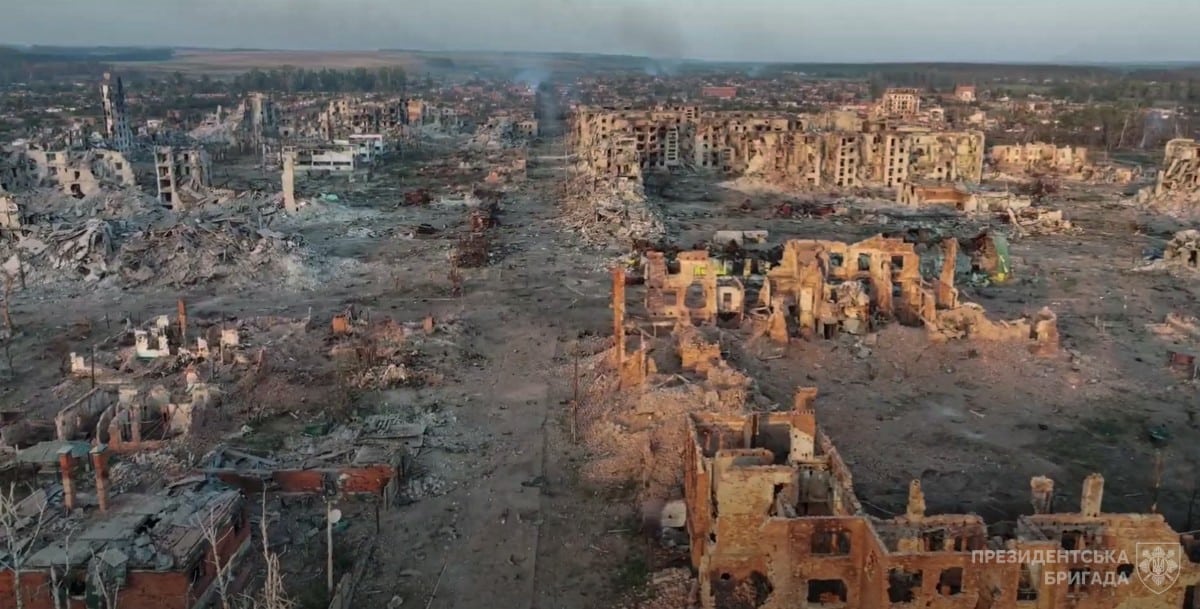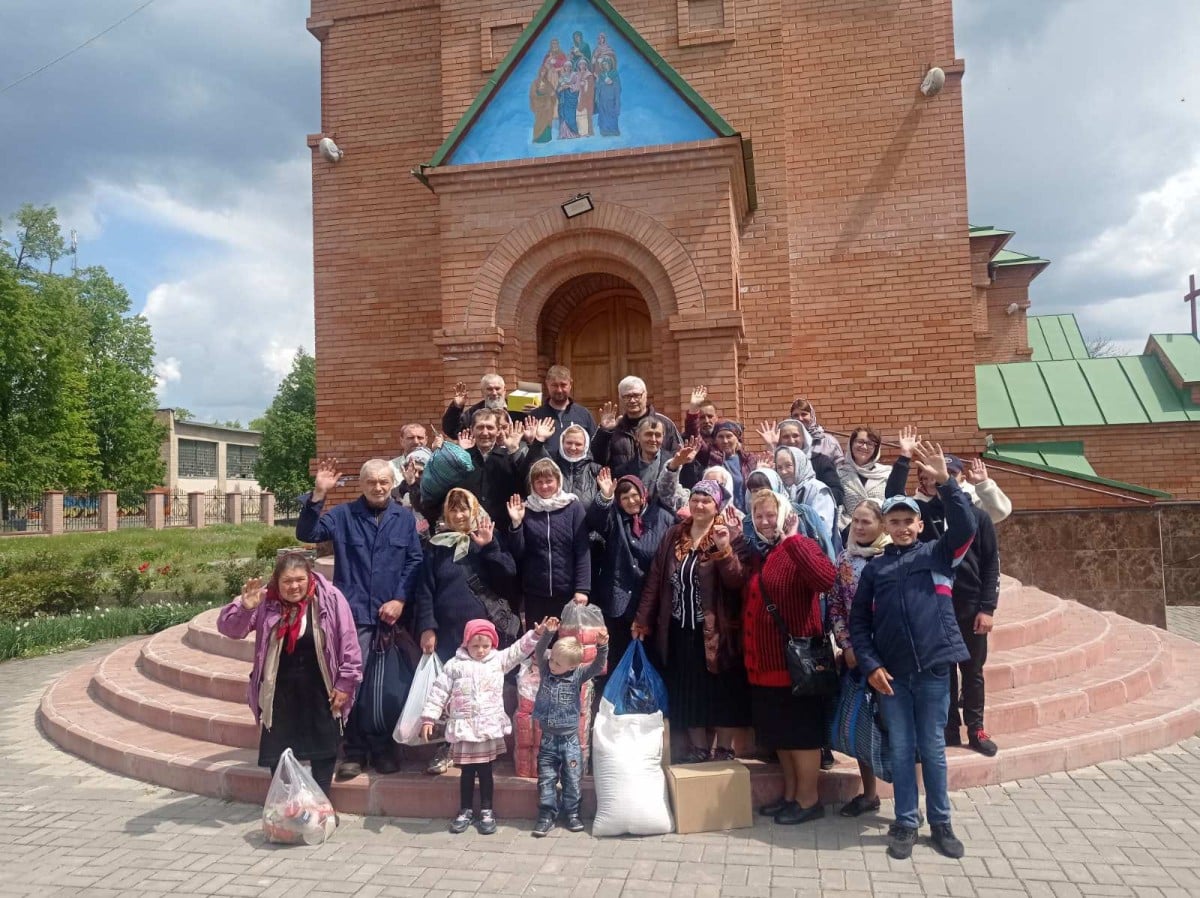

This recent undated handout photograph, released by the Presidential Brigade of the Armed Forces of Ukraine on September 5, 2024, shows the ruins of the Ukrainian town of Vovchansk, in the Kharkiv region, located approximately five kilometers from the state border with the Russia. FILE PHOTO/Agence France-Presse
KHARKIV — “It barely exists anymore,” said the mayor of Vovchansk, an industrial town razed by a Russian onslaught shocking even for the killing fields of eastern Ukraine.
Vovchansk has no great history but its geography could not be more tragic. Just five kilometers (three miles) from the Russian border, drone footage from the Ukrainian military this summer shows a lunar landscape of ruins stretching for miles.
Article continues after this advertisementAnd it has got worse since.
FEATURED STORIES GLOBALNATION Human trafficking rap filed vs. Harry Roque, 2 others GLOBALNATION Persons of interest identified in Zamboanga abduction of US Citizen GLOBALNATION What if Donald Trump loses?“Ninety percent of the centre is flattened,” said mayor Tamaz Gambarashvili, a towering man in uniform, who runs what is left of Vovchansk from the regional capital of Kharkiv, an hour and a half’s drive away.
READ: Volunteers evacuate dogs in Ukraine after new Russian offensive
Article continues after this advertisement“The enemy continues its massive shelling,” he added.
Article continues after this advertisementSix out of 10 of Vovchansk’s buildings have been totally destroyed, with 18 percent partially ruined, according to analysis of satellite images by the independent open-source intelligence collective Bellingcat. But the destruction is much worse in the city centre, which has been leveled north of the Vovcha River.
Article continues after this advertisementAFP and Bellingcat joined forces to tell how, building by building, an entire city was wiped off the map in just a few weeks — and to show the human toll it has taken.
READ: Thousands evacuated as Russia advances in Ukraine’s Kharkiv region
Article continues after this advertisementThe sheer pace of the destruction dwarfed that of even Bakhmut, the “meatgrinder” Donbas region city where some of the most brutal killing of the war has been done, a Ukrainian officer who fought in both cities told AFP.
“I was in Bakhmut, so I know how the battles unfolded there,” Lieutenant Denys Yaroslavsky insisted.
“What took two or three months in Bakhmut happened in just two or three weeks in Vovchansk.”
Invaded, then freedVovchansk had a population of about 20,000 before the war. It now lives only in the memories of the survivors who managed to flee.
Beyond its factories, the city had a “medical school, a technical college, seven schools and numerous kindergartens,” Nelia Stryzhakova, the head of its library, told AFP in Kharkiv.
It even had a workshop that made “carriages for period films. We were even interesting, in our own way,” insisted Stryzhakova, 61.
Add to that a regional hospital, rebuilt in 2017 with nearly 10 million euros ($10.8 million) of German aid, a church packed for religious feasts, and a vast hydraulic machinery plant. Once the town’s economic lifeblood, its ruins are now being fought over by both armies.
Vovchansk was quickly occupied by the Russian army after it invaded Ukraine in February 2022, but was then retaken by Kyiv in a lightning counter attack that autumn.
Despite enduring regular Russian bombardment, it was relatively calm. Then something very different happened on May 10.
Badly defendedExhausted after weeks of hard fighting 100 kilometers to the south, the Ukrainian 57th Brigade was regrouping near Vovchansk when one of its reconnaissance units noticed something strange.
“We spotted two Russian armored troop carriers that had just crossed the border,” recalled Lieutenant Yaroslavsky, who was leading the unit.
READ: Russia evacuates tens of thousands amid Ukraine incursion
They were the advance guard of one of the most intense Russian offensives since the beginning of the war, with Moscow throwing several thousand soldiers at the city.
“There were no fortifications, no mines” to slow down their advance, Yaroslavsky said, still furious at the “negligence or corruption” that allowed this to happen.
Some “17,000 people lost their homes. Why? Because someone didn’t build fortifications,” fumed the 42-year-old officer.
“We control the city today, but what we control is a pile of rubble,” he added bitterly.
President Volodymyr Zelensky cancelled an overseas trip to rush to Kharkiv, admitting that the Russian army had pushed between five and 10 kilometers into Ukraine.
The people of Vovchansk, meanwhile, were living a nightmare.
‘Drones like mosquitoes’“The Russians started bombing,” said Galyna Zharova, who lived at 16A Stepova Street — an apartment building now reduced to ruins, as images analyzed by Bellingcat and AFP confirmed.
“We were right on the front line. No one could come and get us out,” added the 50-year-old, who now lives with her family in a university dormitory in Kharkiv.
“We went down to the cellar. All the buildings were burning. We were crammed into basements (for nearly four weeks) until June 3,” her husband Viktor, 65, added.
Eventually, the couple decided to flee on foot. “Drones were flying around us like wasps, like mosquitoes,” Galyna remembered. They walked for several kilometres before being rescued by Ukrainian volunteers.
“The city was beautiful. The people were beautiful. We had everything,” sighed librarian Stryzhakova. “No one could have imagined that in just five days, we would be wiped off the face of the Earth.”


An undated handout photo released on October 28, 2024 shows Father Igor’s parishioners posing outside the church in Vovchansk. – Father Igor was made parish priest in October 2022 when Vovchansk — which is only five kilometres (three miles) from the Russian border — was briefly retaken by Ukraine, he has lost count of the number of his flock who have perished. He was formerly parish priest in the neighbouring village of Rubizhne, where he also ran a farm which he abandoned on May 22 when it was bombarded. (Photo by HANDOUT / AFP) / RESTRICTED TO EDITORIAL USE – MANDATORY CREDIT “AFP PHOTO / HANDOUT ” – NO MARKETING NO ADVERTISING CAMPAIGNS – DISTRIBUTED AS A SERVICE TO CLIENTS
The 125,000 books in the library she had run at 8 Tokhova Street went up in smoke.
More than half of the families in eastern Ukraine have relatives in Russia. In Vovchansk, before the war in the Donbas region began in 2014, people crossed the border daily to shop, with Russians flocking to the city’s markets.
“There are many mixed families,” said Stryzhakova. “Parents, children, we’re all connected. And now we’ve become enemies. There’s no other way to put it.”
The Russian defense ministry did not respond to AFP’s questions asking for its account of what happened in the city.
Mayor Gambarashvili, who was hit in the leg by shrapnel as he oversaw the city’s evacuation, shook his head when asked to estimate the number of civilian casualties.
Dozens, no doubt. Perhaps more. There were still around 4,000 people in Vovchansk on May 10, mostly older people, since most families with children had been evacuated months earlier.
Families divided by warKira Dzhafarova, 57, believes her mother, Valentina Radionova, who had lived at 40 Dukhovna Street in a small house with a charming garden, is likely dead.
Their last phone conversation was on May 17. “At 85, I’m not going anywhere,” her mother insisted. Satellite images and witnesses have since confirmed that the house was completely destroyed.
“Since then I know it’s over,” sighed Kira, who provided DNA for identification, if and when the fighting ends.
In a particularly cruel irony, her mother, a Russian national, had moved to Vovchansk so she could be equidistant between her two children, who had fallen out.
Kira has lived in Kharkiv for 35 years and became officially Ukrainian two years ago. Her older brother, who she believes supports Russian President Vladimir Putin, remained in Belgorod, the family’s hometown and the first big Russian city on the other side of the border.
Kira, a psychiatrist, now only refers to him as her “former brother”.
AFP was unable to contact him directly.
Volodymyr Zymovsky, 70, is also missing. On May 16, he decided to flee the bombardment in a car with his 83-year-old mother, his wife Raisa, and a neighbor. Zymovsky and his mother were both shot dead, “most likely by a Russian sniper”, Raisa said.
Amid the hail of bullets, the 59-year-old paediatric nurse had barely got out of the car when she was grabbed by Russian soldiers and held for two days. She managed to escape, hid in a neighbor’s cellar for a night, and eventually fled through the forest.
She recounted her harrowing odyssey in a calm, measured voice. One thing alone seems to matter to her now: finding the bodies of her husband and mother-in-law and giving them a proper burial.
‘They took my son’A rumor has circulated among the survivors that the bodies that littered the streets of Vovchansk for days were thrown into a mass grave. Where and by whom, no one knows.
A handful of civilians still remain in Vovchansk. Oleksandre Garlychev, 70, claims to have seen at least three when he returned to his former apartment on a bicycle in mid-September to retrieve belongings.
Garlychev lived at 10A Rubezhanskaya Street, in a southern part of the city that was relatively spared. He only left on August 10.
Vovchansk’s survivors — and even a few of its officials — quietly wonder whether it will ever be rebuilt given its proximity to the border, regardless of how the war ends.
Asked whether she could ever forgive her husband’s killer, Raisa Zymovska fell silent for a long time. Then, in a whisper, she replied: “I don’t know, I really don’t. As a Christian, yes, but as a human being… What can I say?”
As for the librarian Stryzhakova, she can no longer bring herself to open a Russian book, even the classics, since her only son Pavlo was killed in the Battle of Bakhmut.
Subscribe to our daily newsletter
“I know that literature is not to blame, but Russia711bet, all of it disgusts me. They took my son, it’s personal.”
READ NEXT Pope Francis offers prayers for Storm Kristine victims Kamala Harris: can underestimated trailblazer beat Trump? EDITORS' PICK Leon intensifies further, signal no. 1 up in Luzon, Visayas areas Duterte takes ‘full legal, moral responsibility’ for drug war NDRRMC: 116 dead due to Kristine, over 6 million affected Duterte takes ‘full legal, moral responsibility’ for drug war Fuel prices set to increase this week Comelec: No excess ballots for 2025 polls MOST READ Leon may turn into typhoon; Signal No. 1 over parts of Luzon, Visayas Discaya camp shrugs off Sotto’s appeal to Comelec to take action vs her DTI mulling more funds for typhoon-stricken businesses PhilHealth’s fault Follow @FMangosingINQ on Twitter --> View comments

